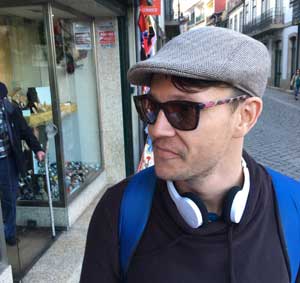How to get into transcreation
 The transcreation <> copywriting exchange
The transcreation <> copywriting exchange
Transcreators are often copywriters too. Therefore, if you are a translator hoping to get into transcreation, it’s a good idea to sharpen your sword in the field of copywriting itself.
Copywriting is something that requires practice, a knack for understanding products and/or markets, and good writing skills. A good writer from any field within the humanities, or any field at all, can break into copywriting without delay. You can literally get an entry-level freelancing job tomorrow and start cutting your chops.
Find a way to practice professionally
So you think you are a good writer and want to break into copywriting immediately, so you can become a better transcreator? There’s just one problem: you’ve never written copy.
The good news is that the person hiring you, unlike in translation, can actually teach you and provide valuable feedback on your work. This is why copywriting is something you can break into right away: if you can get past the typical writing test given during the freelance interview process, you will often find that the client is willing to teach you what you need to know.
What many marketers want is a talented, ambitious writer that they can develop. I got my career started as a technical writer with Lionbridge/HP doing just that, and have been on the teaching end of the equation several times.
Here’s a little secret: everyone in online marketing is learning how to do their jobs by reading the top marketing blogs, because things change so quickly anyway. If you’re a good writer, you can probably arm yourself for an entry level job with a few tips for writing good copy or the difference between features and benefits, along with whatever experience you already have in translation.
Copywriters themselves are constantly re-reading these tips while they are writing. 😉
Where to find copywriting work
Linkedin, Twitter, or other social platforms are great for working on your copywriting business, but often require lots of time and effort (which you should definitely put in).
Freelancer sites like Upwork, Elance, and others have a bad reputation with translators. The customers there know very little about translation and do not know what to expect, and they often get “sticker shock” when they realize how expensive professional translation can be.
But these sites are often great for copywriters, writers, technical writers, and designers. If you don’t believe me, Lise Cartwright has an excellent article about launching your career as a freelance writer on outsourcing sites.
My business partner has built a successful design business with Upwork customers. I myself am reviewing copywriting proposals for Zingword, because where else am I going to find a freelance copywriter? Most of the proposals are from 30-55 euros per hour. My wife manages the design and production of marketing materials, websites, and apps for national theaters, opera houses, and more, for a company whose operations run entirely through Upwork, and whose founder criss-crosses the globe.
A cursory review of copywriters from peopleperhour.com gives you a good idea of what copywriters can fetch. As a newbie, you’ll probably want to charge less than people who have lots of experience, but enough to be satisfied (depending on where you live).
The type of position you are looking for is “copywriting” or “website content,” but avoid “article writing” since that’s not going to get you the experience you need, and is often on the low-end of the writing market. If the company or product is interesting to you, that’s usually a good sign.
Learning markets
People will usually offer training before you start. In fact, you should insist upon a solid “learning session” to go with ongoing feedback. Particularly, you’ll want to target customers who will take you under their wing. In this way, you’ll be able to learn on the job.
Nevertheless, use your judgment. Usually, if the buyer is looking for someone with tons of experience selling bicycles, they won’t hire you. But you should take some responsibility too, because you’ll have to dig deep into why this product is special and people should buy it.
Finally, having the customer be able to provide feedback is invaluable, as compared to translations where this is often not possible.
Learning mediums
As you gather experience, you’ll start to get into “mediums” of communications.
A good example is writing a newsletter in Mailchimp. Newsletters are still the most powerful marketing communications available today, even more powerful than social media, and they have their own idiosyncrasies in terms of copywriting. You can learn the nuances of writing newsletters by researching on the internet and through instructions from your client, but it will take some effort. The same goes for basic SEO (many clients have guidelines to help you).
Eat high quality word snacks
Recent studies show that novels change your brain structure. Any reader who has gone through an extended period of not reading understands this thoroughly; it doesn’t take long until your brain feels like it’s in the doldrums.
Writing great copy isn’t limited to copywriting experience; it also means reading both beautiful and commercial things, paying close attention to rhetorical strategies, word usage, and even prose. If you find yourself doing this already, then you’re probably going to do fine in copywriting.
Challenging myself in my reading has always worked for me. I recently read a best seller and loved it, but I’ve always relied on high quality word snacks to keep my tools sharp.
Punctuation—use it!
Sadly, elaborate punctuation is the sworn enemy of the modern business writer. Writing simply and directly is almost always a recipe for good copy, with flourishes here and there to suit your subject matter.
The semi-colon, for example, has disappeared, which isn’t exactly a new thing: the Google ngram viewer shows you statistics on word usage or punctuation usage over time, and the results for the semi-colon are pretty clear.
But even if sophisticated punctuation is out of style, any translator, copywriter, or transcreator should be able to fluidly employ punctuation at her will. Even if creative punctuation is avoided, it should only be avoided by choice and not by any particular limitations the copywriter or transcreator may have. Ideally, the only thing that limits your letters are the choices you make.
Surely, there will come a day when that em dash in your copy is going to blow somebody away, or that misused hyphen is going to look like the weak, miniature em dash that it really is.
Now, let’s count my grammatical mistakes while I take cover. 😛
Header image credit: kaboompics
Author bio
 Robert Rogge is CEO of Zingword for translations and a wannabe novelist. His half-finished novel carries the working title, The Prospect of Summer. So far, it has served to improve his copywriting skills while not advancing his literary ambitions in any way. He stops short of recommending that you write a novel to improve your copy.
Robert Rogge is CEO of Zingword for translations and a wannabe novelist. His half-finished novel carries the working title, The Prospect of Summer. So far, it has served to improve his copywriting skills while not advancing his literary ambitions in any way. He stops short of recommending that you write a novel to improve your copy.
Zingword helps translators feature themselves online, while also effectively marketing their translation services to prospective clients. We do encourage translators who are practicing transcreation to sign up at our special transcreation page, since our goal is to help you find jobs in your field.

